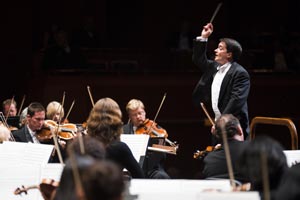Critiques
9 - 18 juillet 2009
It was noticeable that the smaller roles were uniformly well sung, while the conducting of Jacques Lacombe drew some of the most beautiful playing from the ROH orchestra I’ve heard all season…
...Lacombe created an exquisitely balanced performance from the orchestra whilst never allowing them to descend into melodramatic clichés. In all, it was an exciting way to finish the season.
Dominic McHugh, Musical Criticism
juillet 2009Arguably most impressive of all was the conducting of Jacques Lacombe. He kept things moving, allowing the music to generate momentum without ever giving the impression of rushing. His ear for orchestration is astonishing. Right from the expertly balanced opening chords, this facet of his direction was in evidence. It was as if Lacombe was out to discredit the Puccinian nay-sayers who insist this music is all splodge. He has a fine sense of the large-scale as well as the moment-to-moment beauty. Moments of subtlety were many and varied, complementing the grand effects of the Te Deum, the stabbing of Scarpia and Cavaradossi’s execution.
Colin Clarke, Musical Criticism
9 juillet 2009The French-Canadian conductor Jacques Lacombe, making his Royal Opera debut, is supportive in pacing his music, and conducts with flair and an eye for detail throughout.
Hilary Finch, The Times
14 juillet 2009The season has hardly had a dull moment, the highlight perhaps being the momentous Barbiere but this Tosca has to run that a close second, with its central trio of singers as well balanced as anyone could possibly desire, excellent orchestral sound under Jacques Lacombe and a staging which respects the opera’s traditions yet does not become mired in them…
…Orchestrally we were in surprisingly commanding hands, given that the conductor was making his house debut conducting opera — the lower strings especially had been coaxed into chamber music-like intimacy and the brass sparkled rather than blared.
Melanie Eskenazi, Opera Today
12 juillet 2009The conductor, Jacques Lacombe, was making his Royal Opera debut, and it was an auspicious one. His tempi were broad with a grand romantic sweep which made for a traditional Tosca in the best sense of the word. The orchestral timbre was bright and full, and if he was holding the players back to allow the voices to come across in certain places, he did so with the kind of deft artistry that retained the full colour and impact of the score, making one unaware it was happening.
John Woods, Musical Criticism
juillet 2009Jacques Lacombe conducted with firm hand, accompanied the singers very considerately and yet didn’t give in to the temptation to muffle the orchestra so the voices took precedence. Hence, he found the right balance between playing Puccini’s orchestral part in all its luscious greatness and letting the singers be heard – not an easy one.
Enrique Sacau, Mundo Clasico
11 août 2009Jacques Lacombe’s conducting was fluid and sensitive, rightly relishing the splendour and darkness of Puccini’s orchestration without drowning out the singers, and the smaller roles were all persuasively taken.
Ditlev Rindom, Mundo Clasico
11 août 2009Jacques Lacombe: The conductor of the Royal Opera House’s Tosca talks to Colin Clarke (CC)
I arrive at the Royal Opera House,Covent Garden with the sounds of the previous night’s Tosca still ringing in my ears. A high-profile cancellation by Deborah Voigt had added a certain frisson to proceedings, as eyes and ears were certainly going to be focused on the replacements, Angela Gheorghiu and Nelly Miriciou. I’m there, however, to interview the conductor, the Canadian Jacques Lacombe.
Arrangements by the ROH are smooth and slick. Someone meets me at the Stage Door on Floral Street, Covent Garden, escorting me to a small and cozy room set within offices to await the Maestro. The wait is short - mercifully for my nerves.
Two things strike me immediately about Jacques Lacombe…
Colin Clarke, Musical Criticism
16 juillet 2009
